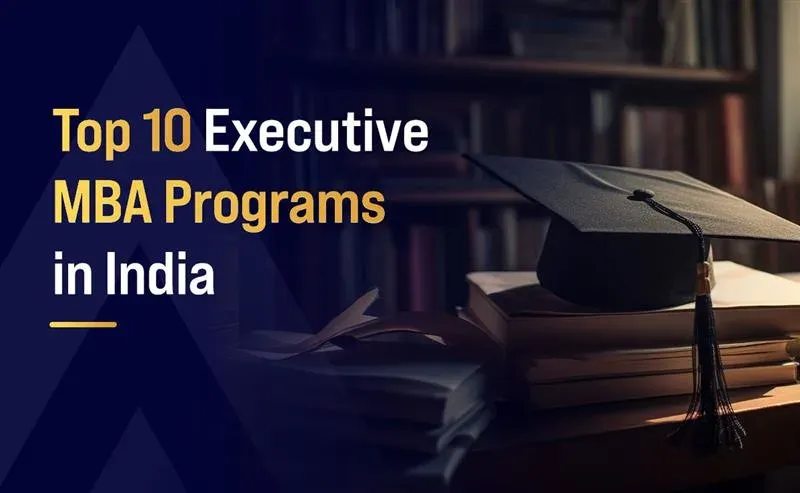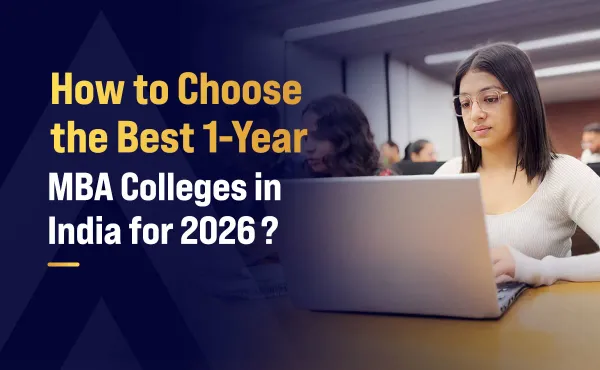Top 10 Executive MBA Programs in India

The executive education market in India has grown at an unprecedented rate, with the market projected to reach ₹2,090 crores by 2029, up from ₹1,480 crores in 2024. The executive MBA programs are one of the most sought-after academic tracks, and those who complete them receive a 20-50 percent salary increase and a 63 percent promotion rate, either at the end of the program or immediately afterward.
Many professionals exploring Executive MBAs today want practical, workplace-ready skills instead of just academic credentials. The Altera PGP Program offers a hands-on, industry-led learning approach where you work on real brand growth challenges guided by practitioners. Cohorts are kept small for close mentorship, so seats fill quickly. For those seeking immediate, career-focused skill development, this can be a strong alternative to traditional EMBA pathways.
This article explains what to look for in an Executive MBA, presents the top 10 programs to consider, and offers practical guidance on eligibility, costs, career impact, and how to choose the right program for your goals.
Why an Executive MBA Makes Sense for Mid-Career Professionals in India?
The following are the factors that make an Executive MBA relevant to mid-career professionals in India.
- Ends the Mid-Career Plateau: Executive MBAs help professionals overcome the stagnation phase, and 63 percent of professionals who complete the program are promoted either during or after the program, rapidly moving into senior positions that may not be available through organic career advancement alone.
- Delivers Tangible Financial ROI: Within two years, graduates can expect salary increases of 20-50 percent, making it one of the best educational investments students can make.
- Enables Immediate Impact: EMBA students can practically apply strategic frameworks and leadership competencies in their workplaces, with impacts instantly noticeable within their organizations (through increased roles and responsibilities and accelerated career advancement).

- Builds Advanced Leadership: Programs are based on C-suite or high-level skills, such as advanced decision-making, change management, and global vision, so that graduates are future-focused leaders poised to take on transformational roles in India's fast-changing business environment.
- Fuels Digital Transformation: Executive MBAs prepare leaders for India’s tech-driven future, integrating digital, AI, and strategic innovation competencies demanded by the nation’s fastest-growing sectors and global organizations.
- Supports Cross-Industry Mobility: Programs gather professionals from multiple backgrounds, facilitating transitions between industries or business functions and developing a broad strategic vision essential for versatile leadership in competitive Indian markets.
Best 10 Executive MBA Colleges in India

The following table lists 10 popular executive MBA programs in India, including the average number of years to complete, the approximate program cost, and the required work experience eligibility. The fees and format are subject to change over time, and therefore, it is always important to verify the specific amount on the official admissions page of the institute before applying.
Institute | Program Name | Duration | Course Fee (in Lakhs) | Minimum Work Experience | Format |
IIM, Ahmedabad | MBA-PGPX | 1 Year | 34.15 | 4 Years | Full-Time, Residential Program |
FMS, Delhi | MBA-Executive | 2 Years | 2.32 | 5 Years | Full-Time, Residential Program |
IIM, Bangalore | Executive Post Graduate Program in Management | 1 Year | 33.71 | 5 Years | Full-Time, Residential Program |
IIT-DMS, Delhi | Executive MBA program | 2 Years | 18 | 3 Years | Full-Time, Residential Program |
IIM, Calcutta | MBA for Executives Program | 1 Year | 33.50 | 5 Years | Full-Time, Residential Program |
IIM, Mumbai | Post Graduate Program for Executives (PGPEx) | 1 Year | 15 | 3-10 Years | Full-Time, Residential Program |
IIM, Lucknow | Post-Graduate Program in Management for Working Executives (PGPWE) | 2 Years | 11 | 3 Years | Students attend classes on alternate weekends, Friday through Sunday on- campus. |
MDI, Gurgaon | PGDM for Experienced Professionals | 18 Months | 16.70 | 3 Years | Full-Time, Residential Program |
SP Jain Institute of Management, Mumbai | (PGPM) for Experienced Professionals | 18 Months | 21.50 | 3 Years | 2 Months of Online Module, 12 Months Full-Time On-Campus and 4 months of International Immersion. |
ISB, Hyderabad | Post Graduate Program in Management | 18 Months | 31.96 | 5 Years | Alternate Weekend Classes, On-Campus. |
Who is Eligible for EMBA Programs?
Most tier-1 executive MBA programs require 3-5 years of post-graduation work experience, with programs like XLRI’s EDABS mandating 10+ years, and the average participant profile is 16 years. The focus is on professionals holding managerial or executive positions rather than entry-level roles.
Candidates also need a bachelor's degree with a minimum of 50% marks (45% for OBC/EWS, 40% for SC/ST categories). Graduates in engineering, commerce, science, and the humanities are equally eligible, with no preference given to any specific discipline.
Top IIMs use GMAT scores, and other programs accept CAT scores for 5 years. Professional accomplishments, leadership potential, and career progression are the primary focus of the selection process, rather than academic performance alone.
There is no age restriction for executive programs, so they are open to professionals at any career level. The program has been structured to support working schedules, including weekend classes, modular learning, and hybrid learning.
Key Benefits of Executive MBA Programs
Here are some key benefits of pursuing an Executive MBA program in India from Tier-1 institutes.
- Accelerated Career Development: Executive MBA programs are designed specifically to help professionals with a minimum of five years of experience advance rapidly into C-suite positions. The course focuses on strategic leadership, corporate governance, and the development of decision-making models required in top-level executive roles.
- Measurable ROI and Placements: 75 percent of executive MBA graduates are promoted within half a year of graduation, which is far faster than the conventional career advancement schedule. Top executive programs also have high placement rates for experienced hires, and many of their graduates become C-suite or CXO-level executives in their companies.
- Strategic Networking and Industry Connections: These programs draw in the top managers, entrepreneurs, and business leaders, which makes them effective in building professional networks. Interestingly, IIM programs boast of massive alumni networks that include Fortune 500 companies and leading startups. The peer learning model offers real-time access to industry knowledge and networking.
- Global Perspective with Indian Context: Best programs combine international immersion modules with business situations in India, offering a unique blend of global and local perspectives. For example, EPGP at IIM Bangalore has 32 partnerships with top business schools across the globe. This will equip graduates with worldviews and a strong understanding of the dynamics of the Indian markets.
- Immediate Application and Implementation: Unlike traditional MBA programs, executive programs emphasize the real-time application of concepts to current professional challenges. Participants implement their learnings immediately in their organizations, creating measurable business impact during the program.
How is the Popularity of Executive MBA Programs Rising Among Indian Professionals?
The following are some of the reasons why the popularity of executive MBA programs is growing among Indian professionals:
- Digital Transformation Need: The post-COVID business landscape has created a pressing need for leaders who can navigate the landscape of technological disruption. Digital transformation, the use of artificial intelligence, and the creation of data-driven decision-making are heavily represented in the curricula of Executive MBA programs today.
- Industry-Specific Growth Drivers: Bangalore, Mumbai, and Delhi NCR were the leading markets in 2023, with the IT capital of India driving demand for technology-related executive programs, as the industry requires strategically trained executives.
- Corporate Investment and Sponsorship Trends: The number of organizations sponsoring employee EMBA education is on the rise as companies recognize the direct business implications. The trend indicates that corporate insights show executive education yields quantifiable benefits by providing better leadership skills and thinking.
- Flexible Learning Innovation: Hybrid and modular formats have brought about the notion of democratizing access to executive education by making it more accessible to more people. These programs are useful for accommodating the various work schedules of different professionals while maintaining academic performance standards.
- Economic Resilience and Skill Security: Professionals increasingly view executive MBAs as a form of career insurance against economic uncertainties. The programs provide skill diversification and leadership credentials that enhance job security and career mobility.
Common Myths Surrounding Executive MBA Programs
The following are some of the most popular myths about executive MBA Programs in India.

1) Executive MBAs lack academic rigor compared to full-time programs
Reality: Executive MBA programs have the same academic standards as regular MBAs but with more intense modes of delivery. The time constraints necessitate greater commitment and concentration and, in many cases, are more difficult than those in conventional courses.
2) Working professionals cannot manage EMBA commitments
Reality: Programs are targeted toward working professionals, with classes held on weekends or in modular formats. As an example, PGP-PRO by ISB provides on-campus weekend courses and interactive online units to enable students to juggle between coursework and their daily jobs.
3) Executive MBAs are only beneficial for career changers
Reality: While graduates report significant career advancement, many pursue EMBAs to excel in current roles or prepare for greater organizational responsibilities. The programs enhance performance in existing positions while preparing for future leadership challenges.
4) Fees always outweigh the returns
Reality: Executive programs provided by IIMs are costly, but colleges like FMS offer their MBA-Executive Evening Program for just INR 2.32 Lakhs, making it more accessible. Additionally, one-year programs reduce opportunity cost, and graduates see measurable salary and role improvements.
5) Indian executive MBAs lack global recognition
Reality: Indian programs achieve significant international rankings. For example, IIM Ahmedabad is ranked 31st in the Financial Times (FT) Global MBA Ranking 2025 and ranked the MBA-PGPX at 62nd position. Also, IIM Bangalore's EPGP has been ranked at #50 in the QS MBA 2023 Ranking. These reflect global academic standards and industry recognition.
Summing Up
The executive MBA program landscape in India is unique in that it presents a rapid growth opportunity for mid-career professionals within the country's dynamic job market. Graduates get direct industry exposure and a highly developed leadership curriculum, which results in a highly sought-after asset in senior and transformational positions.
By choosing a top-tier EMBA, professionals secure quantifiable salary returns while gaining strategic networks and global business perspectives. These programs are tailored for working executives, ensuring no career interruption during upskilling.
To conclude, an Indian Executive MBA degree is not merely a matter of qualifications, but a value-based initiative that ensures fast-tracked career growth, tangible economic gains, and an opportunity to sit at decision-making tables crucial to becoming a future leader.





